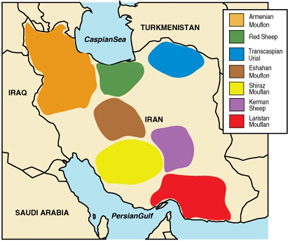 |
Ovis gmelini gmelini x O. vignei arkal
Carnero rojo (Sp), Rotwildschaf (G), Mouflon rouge (F). Also called Alborz (or Elburz) sheep or Alborz red sheep.
DESCRIPTION Shoulder height 29-32 inches (74-81 cm). Weight averages 110 pounds (50 kg), sometimes as much as 150 pounds (68 kg).
The red sheep is believed to be a hybrid between the Armenian mouflon (O. g. gmelini) and the Transcaspian urial (O. v. arkal) that occurs naturally in the Alborz Mountains of northern Iran and the Kavir Desert of north-central Iran. Its offspring are fertile. As a hybrid, its characteristics will vary. The chromosome number varies with the individual animal, ranging from 54 to 58 in Alborz specimens and from 54 to 55 in Kavir specimens. Saddle patch and bib may be present or not, and neck ruff and horn configuration are variable. In the western part of its range, where it blends with the pure Armenian mouflon, the horns are predominantly supracervical, curving above and behind the neck, and there is usually a saddle patch but no bib. In the east, where it blends with the transcaspian urial, the horns tend to be homonymous and there usually is a white bib but no saddle patch. In central parts of its range both homonymous and supracervical horns can be seen, as well as intermediate types. General color is light brown or tan, with individuals varying from very light grayish-brown to light reddish-brown. (The "red" in its common name is misleading, because other types of sheep may actually have redder coats.) Underparts are white.
DISTRIBUTION Northern Iran, in the Alborz (or Elburz) Mountains, plus an isolated population in the Kavir Desert of north-central Iran. Boundaries with the Armenian mouflon to the west and the Transcaspian urial to the east are unclear.
Outside Asia, red sheep have been introduced on private ranches in the United States.
|





